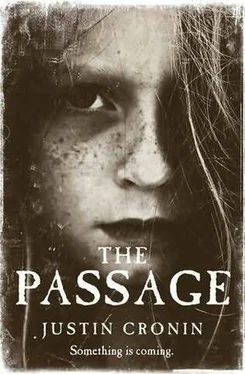Hollis had left with Billie in the morning, to look for the Humvees; working vehicles were in short supply, Olson had said, and if they had survived the explosion, they would be worth the hazards of such a trip. Whether Olson intended to keep them for his own use or return them, Peter did not know. This fact was left ambiguous, and Peter had elected not to press. After their experience in the van, the seven of them nearly cooked to death in the heat, and with Michael still unconscious, the wisest course seemed to be to say as little as they could. Olson had questioned them about the Colony and the purpose of their journey, and there was no avoiding offering some explanation. But Peter had volunteered only that they had come from a settlement in California and had gone looking for survivors. He told Olson nothing about the bunker, his silence suggesting that the place they came from was well armed. There would come a time, Peter thought, when he would probably have to tell Olson the truth, or at least more of it. But that time had not arrived yet, and Olson had appeared to accept the caginess of his explanation.
For the next two days they received only fleeting glimpses of the other inhabitants. Behind the huts stood the growing fields, with long irrigation pipes radiating from a central pumphouse, and beyond that the herd, several hundred head kept in large, shaded pens. From time to time they could see the boiling dust of a vehicle moving against the distant fence line. But apart from this, and a few figures in the fields, they detected virtually no one. Where were the other people? The doors to their huts were not locked, but always across the empty plaza were two men, wearing the orange jumpsuits. It was these men who brought them their meals, usually in the company of Billie or Olson, who reported on Michael’s condition. Michael appeared to have lapsed into a deep sleep-not a coma necessarily, Olson assured them, but something like one. They had seen it before, they said, the effects of the heat. But his fever was down, a good sign.
Then, the morning of the third day, Sara was returned to them.
She possessed no memory of what had happened to her. This part of the story that they related to Michael, when he awakened the following day, was not a lie, nor was Hollis’s tale of how he had found her. They were very happy and very relieved-Sara seemed fine, if a little slow to come around to the news of their new circumstances-but it was also true that both her capture and her return were deeply puzzling. Like the absence of lights and walls, it simply made no sense.
By this time, whatever happiness they felt at the thought of finding another human settlement had been replaced by a deep unease. Still they had seen almost no one, apart from Olson and Billie and Jude, and the two orange-suited men who watched them, whose names were Hap and Leon. The only other sign of life was a group of four Littles in raggy clothing who appeared each evening to play on the tires in the square, though, strangely, no adults ever appeared to claim them; they simply drifted away when the game was over. If they weren’t prisoners, why were they guarded? If they were, why all the pretense? Where was everyone? What was wrong with Michael, why was he still unconscious? Their packs, as Olson had promised, had been returned to them; the contents had obviously been examined, and a number of items, such as the scalpel in Sara’s med kit, had been taken. But the maps, which Caleb had tucked into an inner compartment, had apparently been overlooked. The prison itself was not on the Nevada map, but they found the town of Desert Wells, north of Las Vegas on Highway 95. It was bordered to the east by a vast gray region, no roads or town in it at all, marked with the words NELLIS AIR FORCE TEST RANGE COMPLEX. Situated at the western edge of this region, just a few kilometers from the town of Desert Wells, was a small red square and the name YUCCA MOUNTAIN NATIONAL REPOSITORY. If Peter was correct about where they were, they could see this structure plainly, a humped ridge forming a barricade to the north. Hollis’s drive south with Billie and Gus had given him the chance to scout out more of the landscape. The fence line, Hollis reported, was more robust than it appeared-twin barricades of heavy-gauge steel, roughly ten meters apart, topped with concertina wire. Hollis had seen only two exits. One stood to the south, at the far edge of the fields-this seemed to connect to a roadway that encircled the compound-and the main gate, which connected the compound with the highway. This was flanked by a pair of concrete towers with observation posts-manned or not, they didn’t know, but one of the orange-suited men was stationed in the small guardhouse at ground level; it was he who had opened the gate for Hollis and Billie to pass.
The Haven itself was situated just a few kilometers off the highway that had carried them north. The original prison, a forbidding bulk of gray stone, stood at the eastern edge of the compound, surrounded by a few smaller buildings and Quonset huts. Between the perimeter and the highway, Hollis said, they had crossed railroad tracks, running in a north-south direction. These appeared to head straight toward the ridge of mountains toward the north-odd, Hollis noted, because who would run a pair of tracks straight into a mountain? In their first meeting, Olson had mentioned a railroad depot, in response to Peter’s question about where they got fuel for their vehicles. But on the drive south, Hollis said, they hadn’t stopped, so he couldn’t say if there was a fuel depot or not. Presumably they got fuel somewhere. It was only in the course of this conversation that Peter realized that the idea of leaving was already taking shape in his mind, and that this would require stealing a vehicle and finding fuel to run it on.
The heat was intense; the days of isolation had begun to take their toll. Everyone was antsy and worried about Michael. In their stifling huts, none of them was sleeping. Amy was the most wakeful of them all; Peter didn’t think he’d seen the girl close her eyes. All night she sat on her cot, the features of her face gathered in what appeared to be intense concentration. It was as if, thought Peter, she was trying to work out some problem in her mind.
On the third night, Olson came for them. Accompanying him were Billie and Jude. Over the preceding days, Peter had come to suspect that Jude was more than he had first appeared to be. He couldn’t say why this was, exactly. But there was something disconcerting about the man. His teeth were white and straight, impossible not to look at, like his eyes, which radiated a piercing blue intensity. They gave his face an ageless quality, as if he had slowed time, and whenever Peter looked at the man, the impression he received was of someone who was looking straight into a gale of wind. Peter had become aware that he had yet to hear Olson give the man a direct order-Olson addressed himself entirely to Billie and Gus and the various orange-suited men who came and went from the hut-and in the back of Peter’s mind the idea had begun to form that Jude held some measure of authority, independent of Olson. Several times he had observed Jude speaking to the men who were guarding them.
In the falling dusk, the three appeared across the square, striding toward the hut. With the day’s passing heat, the Littles had appeared on the tires; as the three passed by, they abruptly scattered, like a flock of startled birds.
“It is time to see where you are,” Olson said when he reached the door. He was smiling munificently-a smile that had begun to seem false. It seemed like a smile with nothing behind it. Standing next to Olson, Jude was showing his line of perfect teeth, his blue eyes darting past Peter into the dim hut. Only Billie seemed immune to the mood; her stoic face betrayed nothing.
Читать дальше












